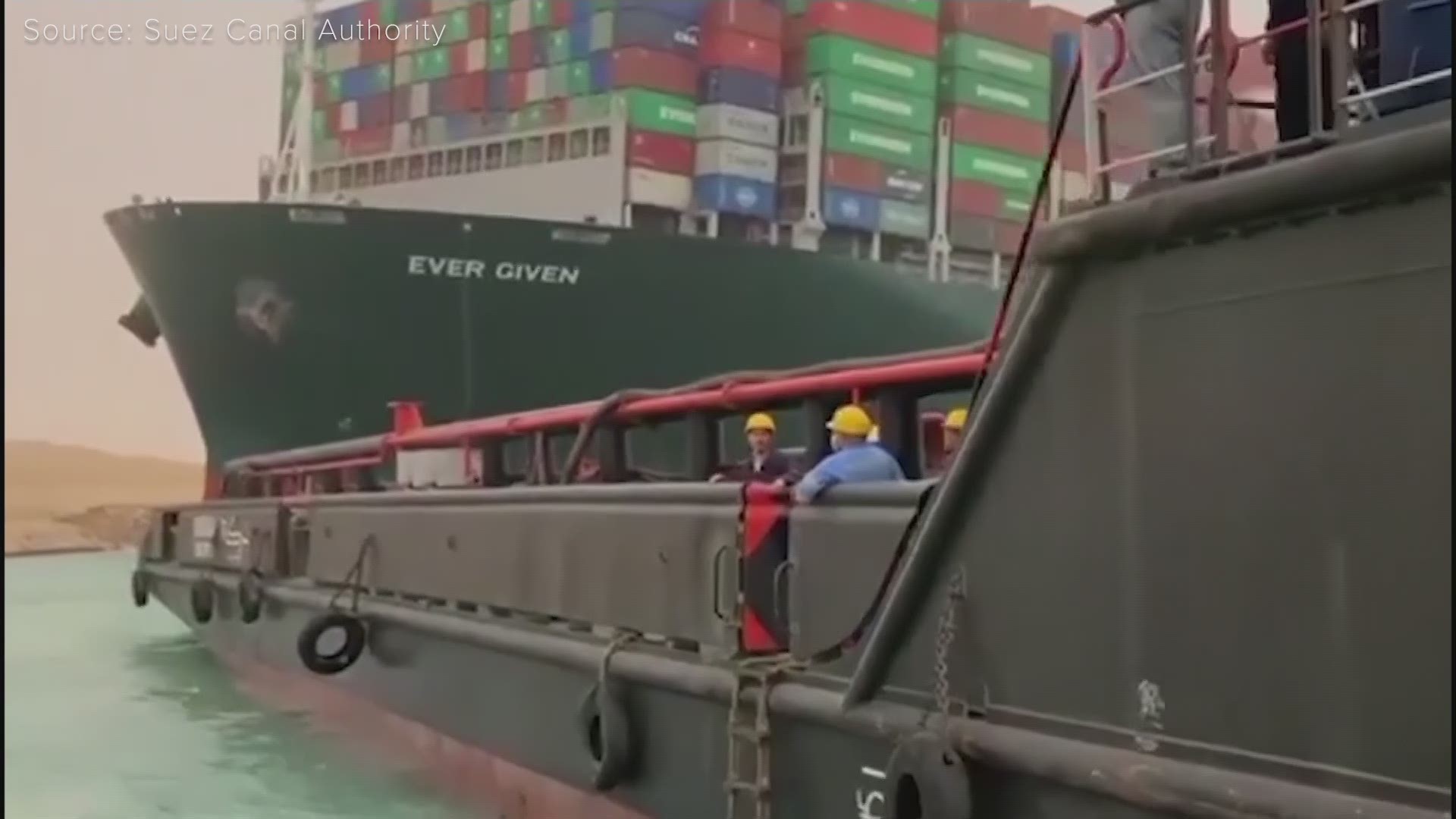PENNSYLVANIA, USA — Editor's note: The above video is from March 24.
Late last month, a cargo ship roughly the same size as the Empire State Building got stuck in the Suez Canal, a hub of international trade. This blockage, which lasted for almost a week, could cause a whole host of supply-chain issues, according to Business Insider.
About 12% of all global trade passes through the Suez Canal, which connects Egypt and Asia. The stuck cargo ship, the Ever Given, blocked hundreds of other freighters from passing through during the six days that it was stuck.
As Grace Kay of Business Insider points out, even before this major blockage, businesses were struggling due to the COVID-19 pandemic. Nike, Costco, Toyota, Honda, and Samsung have all said publicly that supply chain issues are harming business this quarter, Kay goes on.
Experts have said that the blockage costed about $400 million an hour. Some ships took alternative routes to reach their destinations and in some cases added two weeks to their journeys, Kay notes.
Before the ship was freed, many experts said that moving it could take weeks, and while it was freed much more quickly than originally thought, the affects on the supply chains could last for months.
Walter Schalta, CEO of Suzano SA, one of the biggest producers of the pulp used to create toilet paper, told Bloomberg that the Suez Canal jam would likely delay wood-pulp shipments and thus the availability of toilet paper in stores.
The coffee industry was also affected by the jam, according to Bloomberg. This disruption will most likely be felt in Europe, but could be an issue worldwide.
"Can roasters support two to three weeks of delays? Probably not," Raphaelle Hemmerlin, the head of logistics at the Swiss coffee trader Sucafina SA, said to Bloomberg. "I don't think they have the buffer stock that they normally have."
Kay goes on to note that the COVID-19 pandemic has made the furniture industry skyrocket, as more and more people are working from home and are looking for comfortable ways to do so.
The Suez Canal blockage could cause furniture-delivery dates to be delayed for several months, as things are already behind in that sector.
Dan Flickinger, the CEO of Kasala, a furniture chain in Seattle, told The Washington Post in early March that he's already seen significant delays due to an increase in demand.
"A lot of our furniture is handmade and requires a tremendous amount of components, so one missing piece can really mess up a whole lot of production," he said.
Gas prices will continue to rise as well. As Kay notes, oil shipments going through the Suez Canal account for about 5% to 10% of global shipments. A delay in transportation through the canal would slow things down even more.
Experts are saying that this blockage "could not have come at a worse time."
Kay quotes Jon Monroe, a maritime-trade-and-logistics consultant, who said that before the cargo ship got stuck, businesses were already seeing a delay in deliveries.
"This canal closure will not help," he said. "You will start to see product piling up on factory floors."
Despite the seriousness of the event, people worldwide found the stuck ship quite amusing, with dozens of tweets being sent out a day about it, like the following, which references Oprah's interview with Prince Harry and Meghan Markle last month:
Or this one, which references Jamie Lee Curtis' Activia campaigns, a yogurt that "gets things moving:"
Or this one, which references the pervasiveness of "cancel culture:"
The total affect that the Suez Canal blockage will have on United States businesses and supply chains, remains to be seen.

